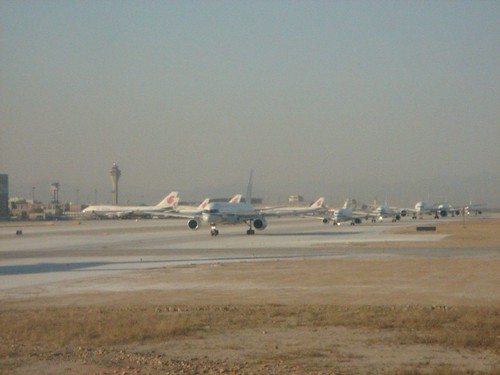 Yesterday I was on a China Eastern plane from Beijing to Shanghai. When the captain made his usual announcements he made them in English first, instead of in Chinese. When I listened to him I realized he was not a Chinese but a foreigner (judging from the accent from a Middle-Eastern country). That was a first for me, I did not know that Chinese airlines started to hire foreign pilots.
Yesterday I was on a China Eastern plane from Beijing to Shanghai. When the captain made his usual announcements he made them in English first, instead of in Chinese. When I listened to him I realized he was not a Chinese but a foreigner (judging from the accent from a Middle-Eastern country). That was a first for me, I did not know that Chinese airlines started to hire foreign pilots.
Coincidentally, this afternoon I was having lunch with a business friend when he told me that he was on a plane from Changsha recently, and that he was very surprised to find out that the captain was a foreigner as well (from South-East Asia). It seems China Eastern started to do some serious recruitment overseas.
I hope for the pilots that they carefully read their contracts before signing them, because the contracts of Chinese pilots often contain clauses that make it almost impossible to quit. Originally these contracts were meant to protect the pilots from unemployment (they get a job for life), but now this is used against them: they cannot be fired, but they can also not leave the job for private reasons.
Last year there was a case where a pilot tried to resign from China Eastern to start working for one of the new private airlines. He was sued by his former employer and asked to pay 1.5 million USD. The court finally ruled that he should pay around USD 200,000 in compensation to the airline – effectively 3 times his yearly salary in his new job.
The reason that airlines do not want to let pilots go is simply because there is a major shortage of aviators in China. The aviation industry is booming, but the flight schools and the military (where many pilots traditionally come from) are not able to supply enough young pilots to fulfill the demand. It seems that they have now finally decided to let foreign pilots in. A smart move, but potentially a dangerous one as well: I am sure the pilots do not speak good Chinese (the Chinese announcement on the plane was made by someone else for example), and I am also quite sure that at least some of the air traffic control staff is not fluent in English.
I doubt foreign pilots will have the same contract as local ones. The reason local pilots cannot quit is indeed there is a shortage of pilots; but also because their training costs are paid by state-owned airlines (it would be too expensive for most Chinese to pay for their own training to fly a plane), and foreign airliners can often pay much higher wages. Therefore if there is not a clause in the contract forbidding them to quit, Chinese airlines would lose huge amounts of money by paying for pilots’ training and yet losing them after that.
That’s indeed the propaganda that the airlines use to justify not letting the pilots go. But many of these pilots had been working for 15 years or more for the airline, I don’t think it is reasonable to still use the ‘high training cost’ argument after so many years.
It would be fair if they changed the contract to 5 or maybe even 10 years, in order to justify and recoup the high training costs. But forcing people to stay on for the rest of their lives is a bit harsh.
wow powerleveling
wow leveling
wow power leveling
world of warcraft power leveling
world of warcraft powerleveling
wow powerlevel
dofus
wow power level
dofus kamas
dofus
wow power leveling
dofus kamas
dofus
dofus kamas
runescape
wow powerleveling
runescape gold
powerleveling
runescape money
power leveling